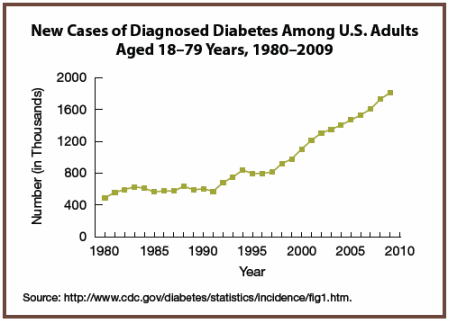Nearly 26 million people in this country have diabetes, according to the Centers for Disease Control and Prevention. Statistics from research company PhRMA indicate another 79 million are showing symptoms of pre-diabetes. It's a disease with serious side effects -- diabetes is the leading cause in the U.S. of blindness and kidney failure.
There are two types of diabetes: type 1, which is a genetic autoimmune disease in which the pancreas doesn't produce insulin, and type 2, which develops over the course of one's life and is characterized by the body not understanding how to use insulin properly. About 90% of all diabetes cases are type 2.

Source: Centers for Disease Control and Prevention.
What's being done
The good news is diabetes care is improving from an educational, preventive, and pharmacological standpoint, especially for type 2 diabetics. The CDC has done a good job of educating the public about proper eating habits, and the passage of Obamacare may result in more preventive doctor's visits to hopefully help prevent the disease.
In addition, we've seen a dramatic improvement in type 2 diabetes treatment over the past year with the approval of Johnson & Johnson's (JNJ 0.03%) Invokana, and Bristol-Myers Squibb (BMY 0.97%) and AstraZeneca's (AZN 0.41%) Farxiga, which are SGLT2 inhibitors.
In previous years the go-to treatment for type 2 diabetes was Merck's (MRK 0.15%) Januvia, which is a DPP-4 inhibitor that works by reducing blood glucose levels via hormones in the liver and pancreas. By comparison, SGLT2 inhibitors work out of the kidneys by inhibiting sodium-glucose co-transporter 2 and blocking glucose reabsorption. The end result is patients' ability to remove excess glucose through their urine in order to maintain glycemic balance. And while DPP-4 inhibitors such as Januvia are weight-neutral, SGLT2 inhibitors have also demonstrated a welcome side effect of weight loss.
However, a small-cap biotechnology company from Texas could be looking to one-up these pharmaceutical giants with an experimental diabetes drug of its own. That company is Lexicon Pharmaceuticals (LXRX 4.88%).
Lexicon's secret weapon
Lexicon has quietly delivered two successful proof-of-concept midstage studies of LX4211 -- one in type 2 diabetes last October, and one for type 1 diabetes earlier this week.
In October, Lexicon's LX4211 met its primary endpoint of clinically meaningful and statistically significant reductions in post-prandial glucose (high blood sugar levels after meals) in type 2 diabetics with moderate-to-severe renal impairment. The proof-of-concept study noted that even patients with the highest levels of renal impairment demonstrated sustainable glycemic balance improvement.
Earlier this week, Lexicon released the results of its proof-of-concept study involving type 1 diabetes patients and LX4211 as an adjuvant to insulin therapy. In the four-week study, Lexicon noted that LX4211 reduced the total mealtime bolus insulin dose by 32%, compared to just 6% for the placebo, and significantly improved glycemic control with a mean HbA1c reduction of 0.55% in the LX4211 treatment arm, compared to 0.06% in the placebo. What's more, the combination did not present with an increase of hypoglycemia, a common concern for type 1 diabetics.
LX4211 is unique for a number of reasons. First and foremost, it's an oral therapy that targets both sodium-glucose transporters, SGLT1 and SGLT2. SGLT2 inhibitors block glucose absorption in the kidneys, while SGLT1 inhibitors block glucose absorption in the gastrointestinal tract. Lexicon believes this dual-inhibitor approach could provide superior glycemic balance over existing therapies.
Source: Lexicon Pharmaceuticals.
Also, consider that LX4211 is geared as an adjuvant therapy for type 1 diabetes, while Invokana and Farxiga aren't. This added indication (though admittedly covering 10% or less of diabetic patients) could be enough differentiation to cause a dogfight between larger pharmaceutical companies to license LX4211. If that were to happen, Lexicon could be looking at a big payday, as well as plenty of cash to fund further research.
Not without risks
However, as much as I've touted Lexicon over the past couple of months, current shareholders and prospective investors should keep a couple of clear risks in mind.
First of all, Lexicon is losing money. It's a wholly clinical-stage biopharmaceutical company, and clinical-stage companies are being hammered by the market at the moment. Investors can certainly be encouraged by its six ongoing clinical studies involving five compounds, but they should understand that success is anything but a given and Lexicon may continue to burn cash.
Second, Lexicon shareholders have already experienced failure following a disappointing midstage study involving LX1033 as a treatment for irritable bowel syndrome. Shortly after this study, Lexicon laid off 45% of its workforce in an effort to conserve cash. That's certainly not an encouraging sign for existing shareholders.
Lastly, there's no guarantee that Lexicon will find a licensing partner for LX4211, even with two positive proof-of-concept trials in its back pocket. While that will mean keeping all revenue for itself if the drug ever makes it to pharmacy shelves, it also means hiring and training a sales staff and handling all manufacturing and clinical development aspects. That's a daunting and expensive task, and one in which Lexicon may struggle to succeed.
Worth watching
Despite these clear risks I'm keeping a close eye on Lexicon. Thus far, LX4211 has been painted in positive light, and I'm intrigued to see if its oral dual-inhibitor combo could hold a comparative edge over Invokana and Farxiga in a much larger late-stage study. If it does, the sky could be the limit. I would certainly suggest more risk-willing and biotech-savvy investors get Lexicon on their watchlist.











